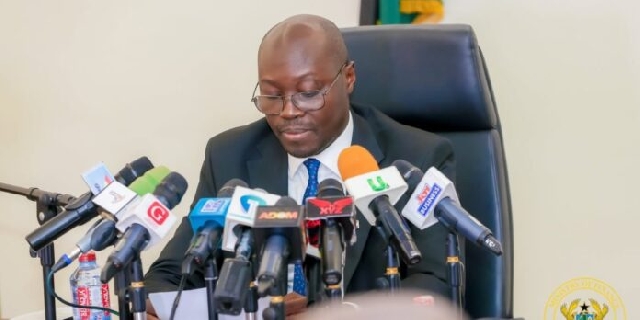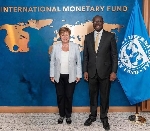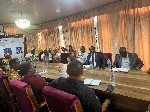IMF engages Ghana on 2025 budget amid plans to scrap some key taxes
 Dr Ato Forson addressing the press
Dr Ato Forson addressing the press
The International Monetary Fund (IMF) has begun critical discussions with the Ghanaian government this week as the country finalizes its 2025 budget, which is scheduled for presentation in March.
The talks come at a pivotal time, with the government planning to abolish several key tax policies, including the E-Levy, betting tax, and COVID-19 levy.
These taxes, introduced by the previous administration to boost domestic revenue, have faced widespread opposition from businesses and the public.
As Ghana remains under a $3 billion Extended Credit Facility (ECF) programme backed by the IMF, the fund will assess how the proposed tax cuts align with the country’s fiscal consolidation goals.
The IMF will seek assurances that removing these levies will not undermine revenue targets or disrupt Ghana’s economic recovery efforts.
Beyond tax reforms, discussions will also address Ghana’s growing energy sector debt, which has placed immense pressure on public finances. Liabilities in the sector are estimated to exceed $2 billion, threatening the financial stability of power producers and the broader economy.
Independent Power Producers (IPPs) have repeatedly raised concerns over delayed payments, warning that prolonged arrears could lead to potential disruptions in electricity supply.
Additionally, the energy sector’s financial distress has contributed to the cedi’s depreciation, as the government requires significant foreign exchange to meet payment obligations.
The IMF is expected to push for structural reforms in the energy sector, including measures to improve cost recovery, enhance efficiency, and establish a sustainable financial model for power production.
During the negotiations, the government is expected to outline a comprehensive plan detailing how it intends to:
Offset revenue losses from the tax cuts Settle outstanding energy sector debts Maintain macroeconomic stability while implementing these reformsThe outcome of these discussions will be closely monitored by investors, businesses, and international partners, as Ghana seeks to strike a balance between fiscal discipline, economic growth, and energy sector stability.
Source: Classfmonline.com/Cecil Mensah
Trending Business

GOLDBOD Jewellery unveils festive Christmas and New Year collections
18:17
Importers and Exporters Association kick against planned introduction of AI system at Ghana's ports
11:47
TDC unveils vision for Oxygen City development in Ho
09:59
First Atlantic Bank PLC marks major milestone with oversubscribed IPO and upcoming GSE listing
08:51
IMF unlocks US$380 million disbursement for Ghana under ECF
00:42
GIPC boss outlines government’s key economic priorities for 2026
15:40
GIPC call stronger investment partnership with Suriname
15:32
Non-performing energy sector heads to be sacked -Energy Minister warns
13:14
Insurance brokers do not face trust issues with insurers – Shalbu Ali
12:11
IBAG reflects on a “mixed year” as industry records major wins
11:46



